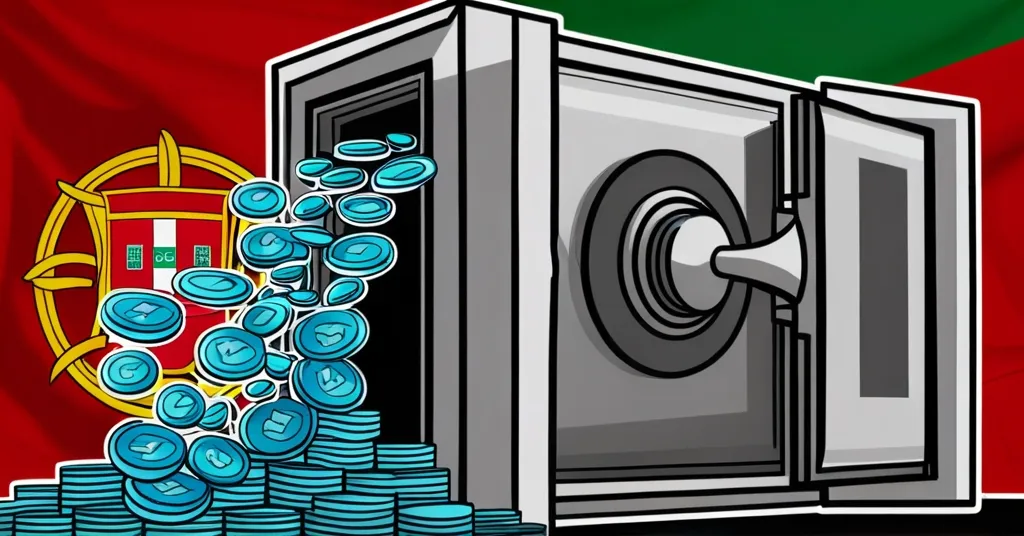BiG Bank Halts Fiat to Crypto: Portugal’s Regulatory Shift and DeFi Push

Portugal’s BiG Bank Halts Fiat Payments to Crypto Platforms: Navigating Regulatory Shifts
Banco de Investimento Global (BiG), managing assets close to €7 billion, has halted fiat payments to cryptocurrency platforms, signaling a shift in Portugal’s once crypto-friendly stance amidst evolving regulations.
- BiG suspends fiat payments to crypto platforms
- Delphi Labs’ José Maria Macedo criticizes the move
- Portugal’s evolving regulatory landscape
BiG slammed the brakes on fiat payments to crypto platforms, aligning with a growing trend across Europe as financial institutions tighten their grip on digital assets. This move, influenced by the EU’s Markets in Crypto-Assets Regulation (MiCA), aims to create a unified digital asset framework. MiCA, a new set of rules from the European Union, is designed to regulate cryptocurrencies, ensuring they are used safely and fairly. Critics argue that such restrictions could push the crypto industry further into the shadows of decentralized finance (DeFi), which refers to financial services built on blockchain technology, allowing users to interact directly without intermediaries.
José Maria Macedo, co-founder of Delphi Labs, didn’t hold back in his critique of BiG’s decision. He stated,
“Crypto is inevitable, banks are dead, and these abuses of power will only red pill more ppl into moving their wealth on-chain.”
The term “red pill” is often used in crypto to describe becoming aware of a new reality, understanding the importance of decentralization. Macedo’s comments reflect a sentiment among crypto enthusiasts that such restrictions might inadvertently boost blockchain platforms. His perspective aligns with the Bitcoin maximalist view, which champions decentralization and financial sovereignty, yet acknowledges the unique roles that altcoins and other blockchains play in the broader financial revolution.
However, not all Portuguese banks are following BiG’s lead. For instance, Caixa Geral de Depósitos continues to allow fiat transactions to crypto platforms. This divergence highlights the ongoing debate within the financial sector about how to approach cryptocurrencies. Some argue that such measures are necessary to protect consumers and prevent fraud, offering a counterpoint to the views of crypto advocates like Macedo.
Portugal’s journey from a crypto haven to a more regulated environment has been swift. Once celebrated for its tax-free crypto trading policies in 2019, the country now faces a new reality with the introduction of a 28% capital gains tax on short-term crypto holdings in 2023, while long-term investments remain tax-free. This shift reflects a broader global challenge of balancing innovation with security in the cryptocurrency sector. The new tax laws, combined with BiG’s policy, could push users toward DeFi alternatives, as noted by Mario Nawfar, indicating a potential shift in user behavior.
The situation in Portugal mirrors the global crypto regulation landscape, where countries like El Salvador are adjusting their policies to find the right balance between fostering innovation and ensuring financial security. Europe presents a diverse regulatory environment, with the Czech Republic considering Bitcoin in foreign exchange reserves, France’s BPCE planning to introduce crypto services, Germany focusing on blockchain compliance, and Switzerland taking a progressive stance on tokenized assets. This varied approach underscores the complexity of integrating cryptocurrencies into the traditional financial system while managing risks.
From a Bitcoin maximalist perspective, BiG’s decision could be seen as a catalyst pushing more individuals towards Bitcoin’s core principles of decentralization and financial sovereignty. Yet, while Bitcoin remains the flagship cryptocurrency, the broader ecosystem, including altcoins and DeFi platforms, continues to play a crucial role in the financial revolution. This nuanced view acknowledges the unique roles that different cryptocurrencies and blockchains serve, even as Bitcoin leads the charge.
The future of Portugal’s crypto market remains uncertain. Will other banks follow BiG’s lead, or will they continue to support crypto transactions, maintaining Portugal’s reputation as a crypto-friendly destination? As the regulatory landscape evolves, so too will the strategies of crypto enthusiasts and investors, navigating the fine line between innovation and compliance. Looks like BiG Bank’s new motto is ‘Why go big when you can go home?’
Key Takeaways and Questions
- What action did Banco de Investimento Global (BiG) take regarding cryptocurrency platforms?
BiG suspended fiat payments to cryptocurrency platforms.
- How did José Maria Macedo react to BiG’s decision?
He criticized the move, suggesting it could lead more people to transfer their funds to blockchain platforms.
- Are other Portuguese banks following BiG’s policy on crypto payments?
No, other major banks like Caixa Geral de Depósitos still allow fiat payments to crypto platforms.
- How has Portugal’s approach to cryptocurrency taxation changed since 2019?
In 2019, Portugal offered tax-free crypto trading, but in 2023, a 28% capital gains tax was introduced on short-term crypto holdings.
- What broader regulatory trend does BiG’s decision reflect in Europe?
It reflects the trend of stricter regulations on cryptocurrencies, aligned with the EU’s Markets in Crypto-Assets Regulation.
- What challenges do countries face in regulating cryptocurrencies?
Countries face the challenge of balancing innovation and security in the cryptocurrency sector.
- How are countries like El Salvador responding to the global crypto regulation landscape?
El Salvador is adjusting its policies to find a balance between fostering innovation and ensuring security.



